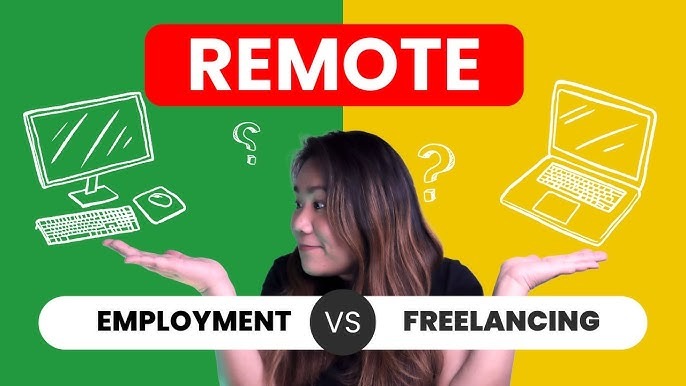? 1. Introduction: Navigating Work Flexibility in the UAE
In 2025, flexible work models have become a defining feature of the UAE’s professional landscape. From large multinational corporations offering remote positions to independent professionals embracing freelancing, the options have never been broader. For those evaluating career paths, it’s crucial to understand the difference between remote work in the UAE and freelancing.
This article explores both avenues, defining each, outlining the pros and cons, legal requirements, and helping you decide which path suits your goals. Whether you’re relocating to the UAE, are already a resident, or are considering a hybrid approach, this guide will help you make an informed choice.

? 2. What Is Remote Work in the UAE?
Remote work in the UAE refers to employment where individuals perform their job duties from a location outside of a traditional office. This can be from home, a co-working space, or even abroad (depending on the employer’s policy).
Key Characteristics:
- Employee status under a company
- Regular salary and benefits
- Tax residency is often linked to employer location
- Fixed working hours or flexible schedule
Remote work in the UAE has grown significantly post-pandemic, driven by digital transformation and companies aiming to attract global talent. Emirati companies and international firms with UAE operations increasingly support remote setups.

? 3. What Is Freelancing in the UAE?
Freelancing in the UAE involves self-employment, where individuals offer services to clients or companies without a long-term contract. You are your boss, and your income is based on projects or hourly rates.
Key Characteristics:
- No formal employer
- Must obtain a freelance license or permit
- You manage your taxes, insurance, and business operations
- Greater flexibility and independence
The rise of digital platforms and the introduction of the freelance visa have made it easier to engage in freelancing legally and profitably. Many creatives, developers, consultants, and marketers find success through this route.

? 4. Legal Framework: Setting Up for Remote Work vs. Freelancing
Remote Work in the UAE:
- Usually backed by a work visa and residence permit sponsored by the employer
- Follows standard UAE labor laws
- Employees have access to health insurance, end-of-service benefits, and paid leave
Freelancing in the UAE:
- Requires a freelance permit or license, such as from Dubai Development Authority, RAKEZ, or twofour54 Abu Dhabi
- No automatic access to healthcare or employment benefits unless personally arranged
- Must comply with UAE VAT laws if income exceeds AED 375,000 annually
Understanding the legal distinction is crucial. Many remote workers are surprised to learn they need a work visa, while freelancers must manage their licensing and compliance.

✅ 5. Pros and Cons of Remote Work in the UAE
Pros:
- Stable income and benefits
- Work for international companies while living in the UAE
- Structured routine and career growth opportunities
Cons:
- Less autonomy
- Possible time zone mismatches with global teams
- Dependency on the employer’s policies
Remote work in the UAE is ideal for professionals who want job security and a structured environment while enjoying the flexibility of working from anywhere.

✨ 6. Pros and Cons of Freelancing in the UAE
Pros:
- Full control over work schedule and clients
- Potential for higher income
- Ability to scale your services into a business
Cons:
- No employer-provided benefits
- Variable income
- Requires strong self-discipline and marketing skills
Remote work in the UAE and freelancing both offer flexibility, but freelancing gives you unmatched freedom and the chance to build a personal brand.

? 7. Income Potential and Job Stability
Remote workers enjoy consistent monthly pay, promotions, and employment benefits. On the other hand, freelancers can scale their income significantly depending on their client base, skill level, and market demand.
Freelancing can sometimes feel unstable, especially for beginners, but seasoned freelancers often earn more than their remote-employed counterparts.
Remote work in the UAE gives security; freelancing offers earning potential.
? 8. Licenses and Work Permits
Remote workers:
- Need a work visa sponsored by their employer
- Cannot work for another employer without special approval
Freelancers:
- Require a freelance license
- Popular zones include: Dubai Media City, Abu Dhabi’s twofour54, and Sharjah Media City (Shams)
Many free zones offer affordable packages that include workspace and visa services. The freelance visa has made remote work in the UAE even more accessible for digital nomads.
? 9. Where to Work: Coworking Spaces vs. Home Offices
Coworking spaces are booming across Dubai, Abu Dhabi, and Sharjah. Freelancers often opt for these to stay productive and network, while remote workers may enjoy home setups provided by their employers.
Remote work in the UAE benefits from government support in creating smart work hubs and public co-working centers.
? 10. Popular Roles for Remote Work and Freelancing
Remote Work Roles:
- Customer service
- Marketing and communications
- Tech support and software engineering
Freelancing Roles:
- Graphic design
- Copywriting and translation
- Web development
- Photography and videography
Whether you choose remote work in the UAE or freelancing, the country’s infrastructure supports both models robustly.
? 11. Which One is Better for You?
Consider these questions:
- Do you prefer a stable income? — Go remote.
- Do you value independence and variety? — Try freelancing.
- Are you just starting out? — Remote jobs offer training and stability.
- Do you have an existing client base or niche skill? — Freelancing may be more rewarding.
Choosing between freelancing and remote work in the UAE depends on your lifestyle, risk appetite, and career goals.
?️ 12. UAE Government Support and Initiatives
The UAE government is pro-innovation and offers several schemes to support both remote workers and freelancers:
- Golden Visa for top freelancers and skilled workers
- Dubai Remote Work Visa
- Free zone hubs for freelancers
- Smart city infrastructure
These initiatives make remote work in the UAE a viable and attractive option for global talent.
✈️ 13. Can You Do Both?
Yes! Many professionals combine both options:
- Work remotely for a company while freelancing part-time
- Transition from remote employment to full-time freelancing
- Use remote roles to build skills and freelance credibility
Just ensure you meet legal requirements. Remote work in the UAE and freelancing can coexist beautifully.
? 14. Conclusion: Making the Smart Career Move
As work becomes more flexible, professionals in the UAE are rethinking traditional paths. Whether you’re leaning toward remote work in the UAE for its structure or freelancing for its freedom, the choice depends on your unique needs.
Evaluate your goals, lifestyle preferences, and legal standing. The UAE offers the best of both worlds, backed by government support, world-class infrastructure, and a growing digital economy.
In 2025 and beyond, whether you choose freelancing or remote work in the UAE, you’re making a bold step toward freedom and fulfillment.
? External Resources:
Also Read: Pros and Cons of Working from Home: A Complete 2025 Guide


One thought on “Freelancing vs. Remote Work in the UAE: Discover What Suits You Best in 2025”